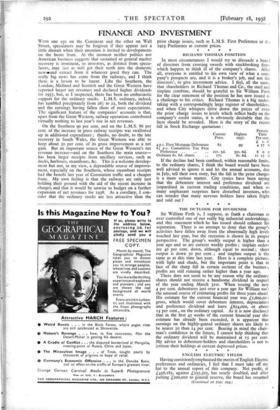THE OUTLOOK FOR DIVIDENDS
Sir William Firth is, I suppose, as frank a chairman as ever controlled one of our really big industrial undertakings, and this statement which he has issued should enhance his reputation. There is no attempt to deny that the group's activities have fallen away from the abnormally high levels touched last year, but the recession is shown in its proper perspective. The group's weekly output is higher than a year ago and so are current weekly profits ; tinplate orders are 40 per cent. down, although equal to normal ; sheet output is down 50 per cent. ; and tinplate output is the same as at this time last year. Here is a complete picture, With light and shade but the important point is that in face of the sharp fad in certain sections of the business, profits are still running rather higher than a year ago.
There does not seem to be any reason why the ordinary shares should not receive a handsome dividend in respect of the year ending March 31st. When issuing the new 4 per cent. debentures just over a year ago Sir William too': the unusual course of estimating profits for three years ahead. His estimate for the current financial year was LI,600,00) gross, which would cover debenture interest, depreciation and preference dividend and leave £624,000, or about 14 per cent., on the ordinary capital. As it is now disclosed that in the first 45 weeks of the current financial year this estimate has already been exceeded, it is apparent that earnings on the highly-geared ordinary shares are likely to be nearer 20 than 14 per cent. Bearing in mind the chair- man's confidence in the future, I cannot help thinking that the ordinary dividend will be maintained at 15 per cent. My advice to debenture-holders and shareholders is not to jettison their holdings at current depressed prices. * * * *










































 Previous page
Previous page